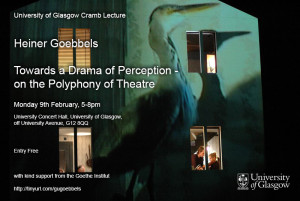
The annual Cramb Lecture invites esteemed music theorists and practitioners to the University of Glasgow. This year’s speaker, who was invited thanks to the support of the Goethe Institut in Glasgow, stood out due to his cross-disciplinary appeal. As an innovator and visionary in the fields of both music and contemporary theatre, Heiner Goebbels drew an eclectic crowd of academics from various subjects, experimental practitioners across Scotland as well as Germanophiles curious about contemporary developments in German art practices.
Goebbels, whose career as a composer and director began in the mid-1980s with the creation of experimental audio dramas based on playwright Heiner Müller’s texts, is renowned for creating performance works in which concert, opera and theatre intersect. His work has been shown at numerous important theatre and music festivals, including the Edinburgh International Festival, and the significance of his work has been acknowledged through prizes such as the prestigious International Ibsen Award.
In his lecture at the University of Glasgow, Goebbels gave the attendees privileged insight into the thought-processes and the compositional structures behind some of his most well-known works beginning with Ou bien le débarquement désastreux (1993), his first work for the stage that drew on a variety of music traditions and included texts by Joseph Conrad, Heiner Müller and Francis Ponge. Following this he covered his work with the self-organised music collective Ensemble Modern and finally ended with his more recent production Stifters Dinge (2007), a performative installation without actors in which several pools of water, lights, curtains, projections and voices take the reins over the stage. Throughout the lecture component of the evening Goebbels suggested that his theatre practice might be captured through metaphors drawn from the field of musical composition. Central to this was the idea of polyphony that describes compositions in which several musical textures are played concurrently. Through showing excerpts from the documentation of his performances alongside his explanations of their structure, Goebbels tracked the many guises in which polyphony appears in his theatre.
He proposed that the polyphony of his theatre can be located in the relationship between the many different elements that make up the theatrical experience: music, speech, light, set, movement, objects and so on. By turning each of these into independent textures and subsequently layering them, he creates a theatre in which – like in polyphonic music – different ‘voices’ compete for our attention. The effect of this is that the dramatic conflict is no longer to be found in a narrated story but becomes a feature of how these elements sit together on the stage and it is up to the spectators to create their own ‘story’ from the disparate elements.
Following the lecture, Goebbels opened up the floor to questions. When asked about the political outlook of his theatre works, he suggested that they might be understood as a liberation of the audience since we are not confronted by a straight-forward message but are prompted to put our own imaginative resources into practice. In this way, the polyphony of Goebbels’ theatre has an emancipatory agenda as we are transformed from passive receivers into active fantasists.
Written By: Cara Berger, Theatre Studies


